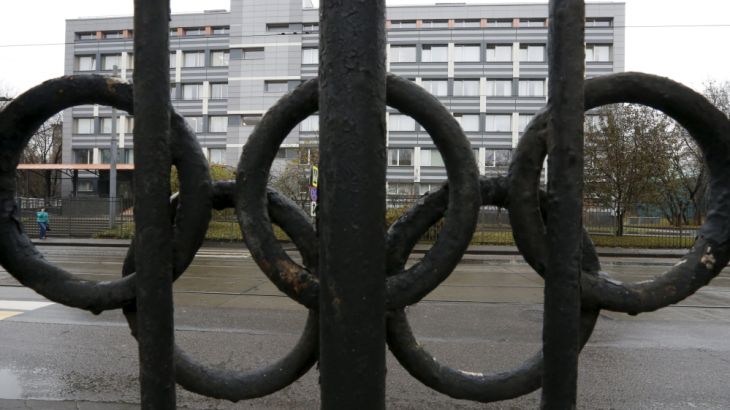Is athletics losing its fight against doping?
Suggestions and proposals seek improved working and rooting out doping but is enough being done?

The doping scandal that has engulfed Russian athletics has thrust the World Anti-Doping Agency (WADA) into the global spotlight like never before.
There are questions about its power, independence and effectiveness – even about the future of the agency itself.
Keep reading
list of 4 itemsWest Africa’s Sahel becoming a drug trafficking corridor, UN warns
Behind India’s Manipur conflict: A tale of drugs, armed groups and politics
Why are some countries decriminalising drugs?
When an independent commission, led by WADA’s founding president Dick Pound, published a report detailing state-sponsored doping in Russian athletics, shockwaves were sent around the world.
Current WADA president Sir Craig Reedie inevitably found himself in the firing line. The Scot insists he runs a “good agency which acted decisively” as soon as the doping allegations came to light, though.
|
|
He outlines the steps WADA has taken and says defiantly that “the world was watching and we acted”.
Two weeks after Russian officials were first exposed – in a documentary broadcast by the German TV station ARD last December – Reedie set up an independent commission chaired by Pound.
“They were very serious allegations and the end result was that, almost immediately, we set up the commission,” Reedie told Al Jazeera.
“I was both surprised and depressed by the revelations in the documentary, because they were very serious allegations. The end result was that, almost immediately, we set up the independent commission.
“The reaction to the German programme was the correct one. Now it is up to us to react to the result of the report in the correct way.”
A day after publication of the commission’s report in November, WADA provisionally suspended Russia’s accredited anti-doping laboratory in Moscow.
The agency’s most decisive step in the saga came last month when it declared the Russian anti-doping agency RUSADA “non-compliant” and provisionally suspended it.
World athletics’ governing body, the IAAF, followed that up by suspending the Russian athletics federation, putting the country’s participation in the 2016 Rio Olympic Games in doubt.
Since the independent commission’s report was published, Russia has been conciliatory, with even President Vladimir Putin appearing on state television to promise that everything possible would be done to resolve the issues.
Russia’s Olympic Committee will oversee changes and former athletics federation president Valentin Balakhnichev is set to be expelled from the national executive body.
What the future holds
|
|
Proposals from the independent commission and International Olympic Committee would dramatically change the agency in the future.
Reedie broadly agrees with the proposals and has set up a task force to look into them. But he said WADA needed increased funding for those proposals to be put into action.
The IOC suggested three main changes.
The first concerns testing and results. Currently, WADA accredits labs around the world. This is seen as a potential conflict of interest, so the IOC has suggested that WADA carries out testing itself – through a fully independent body rather than simply providing guidelines.
“It is very difficult for a sport to promote and police itself,” Pound said. “Maybe the answer is to have an independent body doing it all.”
The second proposal involves WADA’s investigatory powers, which are limited. It was only earlier this year that it obtained any powers to initiate doping investigations.
“We currently have two investigators and there is a recommendation we should do more and be prepared to do more,” Reedie said.
Russian whistle-blowers Vitaliy Stepanov and Yulia Stepanova, whose testimony formed the basis of the sensational ARD documentary, first contacted WADA with their allegations, only for the agency to fail to rigorously follow up on them.
Funding woes
Reedie admits the size of his investigating team does make it difficult to follow all leads.
“Lots and lots of people are speaking to us on lots and lots of issues all the time,” he said.
The third IOC proposal concerns sanctions and punishment. It proposed that the Court of Arbitration for Sport, and not WADA, hand out bans and sanctions, leading to greater independence and efficiency.

Reedie admitted the reasoning behind most of the proposals was compelling, but whether or not they can be implemented is likely to come down to one thing: money.
WADA is funded by national governments, with the IOC matching the money they contribute. According to its 2015 budget, 130 countries donated a total of $14m to WADA.
Pound admitted the changes were “currently too much for us to do on the basis of the budget we have”.
The finding is relatively paltry when you consider the funds being put into sport – and potentially doping programmes – by countries around the world. It also looks likely to fall short if WADA is expected to start investigations and to take over testing programmes globally.
“I’m pleased with Pound’s assertion that, although he wants us to do more, he does recognise that we may not have sufficient funds to do it as well as he would like,” said Reedie, who has been involved with WADA for 16 years.
“Having been the chairman of the finance committee for years, I, perhaps more than anybody else, know exactly that situation. And with a bit of luck, our partners, particularly the public authorities, will look at that very closely.
“Then, if they decide happily to increase their contributions, I’m sure those will be matched by the Olympic movement.”
Follow Simon Austin on Twitter: @sport_simon